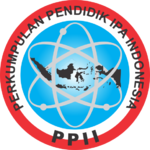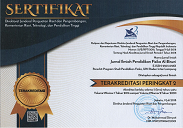Does TPACK Mastery Affect Teamwork Skills? A Causal-Comparative Study of Pre-Service Physics Teachers
Abstract
Keywords
Full Text:
PDFReferences
Barak, M. (2018). Are digital natives open to change? examining flexible thinking and resistance to change. Computers & Education. https://doi.org/10.1016/j.compedu.2018.01.016
Bektas, C., & Sohrabifard, N. (2013). Terms of organizational psychology, personnel empowerment and team working: A case study. Procedia - Social and Behavioral Sciences, 82, 886–891. https://doi.org/10.1016/j.sbspro.2013.06.366
DeChurch, L. A., & Mesmer-Magnus, J. R. (2010). The cognitive underpinnings of effective teamwork: A meta-analysis. Journal of Applied Psychology, 95(1), 32.
Donia, M. B. L., O’Neill, T. A., & Brutus, S. (2018). The longitudinal effects of peer feedback in the development and transfer of student teamwork skills. Learning and Individual Differences, 61, 87–98. https://doi.org/10.1016/j.lindif.2017.11.012
Etzkorn, K. E. B. (2018). Learning to teach online: Measuring the influence of faculty development training on teaching effectiveness through a TPACK lens. The Internet and Higher Education, 38(28–35).
Fu, J. S. (2013). ICT in education: A critical literature review and its implication. International Journal of Education and Development Using Information and Communication Technology, 9(1), 112–125.
Gellerstedt, M., Babaheidari, S. M., & Svensson, L. (2018). A first step towards a model for teachers’ adoption of ICT pedagogy in schools. Heliyon, 4(9), e00786. https://doi.org/10.1016/j.heliyon.2018.e00786
Gibert, A., Tozer, W. C., & Westoby, M. (2017). Teamwork, soft skills, and research training. Trends in Ecology and Evolution, 32(2), 81–84. https://doi.org/10.1016/j.tree.2016.11.004
Habibi, A., Mukminin, A., & Hadisaputra, P. (2020). Heliyon Science teachers’ integration of digital resources in education: A survey in rural areas of one Indonesian province. Heliyon, 6(June), e04631. https://doi.org/10.1016/j.heliyon.2020.e04631
Hastie, C. (2018). Can the social and emotional skills that underpin effective teamwork be taught to undergraduate midwifery students? Women and Birth, 31, S10. https://doi.org/10.1016/j.wombi.2018.08.038
Hobson, C. J., Strupeck, D., Griffin, A., Szostek, J., & Rominger, A. S. (2014). Teaching MBA students teamwork and team leadership skills: An empirical evaluation of a classroom educational program. American Journal of Business Education, 7(3), 191–212.
Hong, B. Van, Tuyen, T., & Luong, N. T. (2018). Teaching capacity of technology teacher: Apllying in the training program of technology teacher in Vietnam. American Journal of Educational Research, 6(12), 1662–1667.
Hussain, R. M. R., & Al Saadi, K. K. (2019). Students as designers of e-book for authentic assessment. Malaysian Journal of Learning and Instruction, 16(1), 23–48.
Keser, & Karagoca. (2010). Langkah-langkah strategi dalam pembelajaran (I). YRama.
Khosravi, P., Rezvani, A., & Ashkanasy, N. M. (2020). Emotional intelligence: A preventive strategy to manage destructive influence of conflict in large scale projects. International Journal of Project Management, 38(1), 36–46. https://doi.org/10.1016/j.ijproman.2019.11.001
Lowther, D. L., Inan, F. A., Strahl, J. D., & Ross, S. M. (2008). Does technology integration work when key barriers are removed?. Educational Media International, 45(195–213).
Mahmood, L. S., Mohammed, C. A., & Gilbert, J. H. V. (2021). Interprofessional simulation education to enhance teamwork and communication skills among medical and nursing undergraduates using the TeamSTEPPS® framework. Medical Journal Armed Forces India, 77, S42–S48. https://doi.org/10.1016/j.mjafi.2020.10.026
Mathieu, J., Maynard, M. T., Rapp, T., & Gilson, L. (2008). Team effectiveness 1997-2007: A review of recent advancements and a glimpse into the future. Journal of Management, 34(3), 410–476.
Nelson, M. J., & Hawk, N. A. (2020). The impact of fi eld experiences on prospective preservice teachers’ technology integration beliefs and intentions. Teaching and Teacher Education, 89, 103006. https://doi.org/10.1016/j.tate.2019.103006
Pugh, C.M., Cohen, E. R., Kwan, C., & Cannon-Bowers, J. A. (2014). Investigating the importance of taskwork in team-based assessments. Journal of Surgical Research, 186(2), 677. https://doi.org/10.1016/j.jss.2013.11.860
Pugh, Carla M., Cohen, E. R., Kwan, C., & Cannon-Bowers, J. A. (2014). A comparative assessment and gap analysis of commonly used team rating scales. Journal of Surgical Research, 190(2), 445–450. https://doi.org/10.1016/j.jss.2014.04.034
Reising, D. L., Carr, D. E., Gindling, S., Barnes, R., Garletts, D., & Ozdogan, Z. (2017). An analysis of interprofessional communication and teamwork skill acquisition in simulation. Journal of Interprofessional Education and Practice, 8, 80–85. https://doi.org/10.1016/j.xjep.2017.07.001
Schmutz, J. B., Meier, L. L., & Manser, T. (2019). How effective is teamwork really? The relationship between teamwork and performance in healthcare teams: A systematic review and meta-analysis. BMJ Open, 9(9). https://doi.org/10.1136/bmjopen-2018-028280
Tam, H. lin, Kwok, S. Y. C. L., Hui, A. N. N., Chan, D. K. yin, Leung, C., Leung, J., Lo, H., & Lai, S. (2021). The significance of emotional intelligence to students’ learning motivation and academic achievement: A study in Hong Kong with a Confucian heritage. Children and Youth Services Review, 121, 105847. https://doi.org/10.1016/j.childyouth.2020.105847
Valtonen, T., Hoang, N., Sointu, E., Näykki, P., Virtanen, A., Pöysä-Tarhonen, J., Häkkinen, P., Järvelä, S., Mäkitalo, K., & Kukkonen, J. (2021). How preservice teachers perceive their 21st-century skills and dispositions: A longitudinal perspective. Computers in Human Behavior, 116(May 2020), 1–9. https://doi.org/10.1016/j.chb.2020.106643
Vaughan, B., Grace, S., & Yoxall, J. (2019). Developing teamwork skills in pre-registration osteopathy education: A qualitative pilot investigation. International Journal of Osteopathic Medicine, 33–34(June), 46–51. https://doi.org/10.1016/j.ijosm.2019.07.003
Vidergor, H. E. (2021). Effects of digital escape room on gameful experience, collaboration, and motivation of elementary school students. Computers & Education, 166, 104156. https://doi.org/10.1016/j.compedu.2021.104156
Valtonen, T., Hoang, N., Sointu, E., Naykki, P., Virtanen, A., Sanna, J., Kati, M., & Johanna, P., Kukkonen, J. (2021). How preservice teachers perceive their 21st-century skills and dispositions: A longitudinal perspective. Computers in Human Behavior. 116 (3), 1–9. https://doi.org/10.1016/j.chb.2020.106643
Voogt, J., & Roblin, N. P. (2012). A comparative analysis of international frameworks for 21st century competences: Implications for national curriculum policies. Journal of Curriculum Studies, 44(3), 299–321. https://doi.org/10.1080/00220272.2012.668938
Wang, C. J. (2019). Facilitating the emotional intelligence development of students: Use of technological pedagogical content knowledge (TPACK). Journal of Hospitality, Leisure, Sport and Tourism Education, 25(January), 100198. https://doi.org/10.1016/j.jhlste.2019.100198
Zelkowski, J., Gleason, J., Cox, D. C., & Bismarck, S. (2013). Developing and validating a reliable TPACK instrument for secondary mathematics preservice teachers. Journal of Research on Technology in Education, 46(2), 173–206. https://doi.org/10.1080/15391523.2013.10782618
DOI: http://dx.doi.org/10.24042/jipfalbiruni.v10i1.8327
Refbacks
- There are currently no refbacks.

Jurnal ilmiah pendidikan fisika Al-Biruni is licensed under a Creative Commons Attribution-ShareAlike 4.0 International License.
![]()







